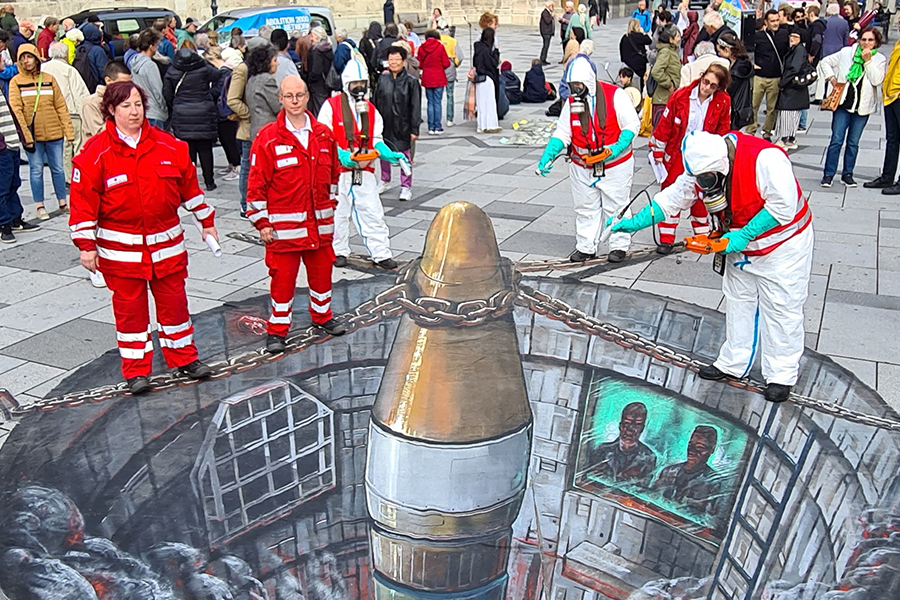co-sponsored by the EastWest Institute, the Center for Nonproliferation Studies, the British-American Security Information Council, the Global Security Institute and the NGO Committee on Disarmament, Peace and Security
Co-chaired by Ambassador Jayantha Dhanapala and Jonathan Granoff
Event Report by Rhianna Tyson
October 24, 2008
New York , New York
At the opening plenary session, Dr. Mohamed ElBaradei, Director-General of the International Atomic Energy Agency said, “We need concrete action. The world cannot afford 27,000 nuclear weapons 20 years after the Cold War.” This urgency of nuclear disarmament highlights the need for a nuclear weapons convention (NWC) — a global, legally binding, technically verifiable, non-discriminatory treaty prohibiting nuclear weapons. In his sterling keynote, Secretary-General Ban Ki-moon lent his support of a convention(1), noting that the Model Nuclear Weapons Convention(2), which he circulated to all UN Member States upon the request of Costa Rica and Malaysia, “offers a good point of departure.”
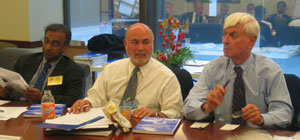 |
|
|
Co-Chairs Amb. Jayantha Dhanapal and Jonathan Granoff, with Amb. Robert Grey, Jr.
|
An afternoon strategy session focused on stimulating negotiations on a NWC. Distinguished participants included, but were not limited to: Ambassador Henrik Salander of Sweden, Executive Director of the “Blix Commission” on Weapons of Mass Destruction and Chairman-elect of the Middle Powers Initiative; Ambassador Bernhard Brasack of Germany; Ms. Annika Thurnborg of the Comprehensive nuclear Test-Ban Treaty Organization; Ms. Alison Kelly, Director of Department for Non-proliferation in the Irish Ministry of Foreign Affairs; Ambassador Adiwati Adiwoso Asmady, Deputy Permanent Representative of Indonesia; Mr. Reto Wollenmann, Counsellor to the Permanent Mission of Switzerland in Geneva; Mr. Khaled Shamaa, Counsellor to the Permanent Mission of Egypt in New York; Ambassador Richard Butler, former Executive Chairman of the UN Special Commission to disarm Iraq and others.
Opening the meeting Ambassador Dhanapala, current President of the Pugwash Coferences on Science & World Affairs and the former Under-Secretary-General for Disarmament Affairs, said it had been a persistent dilemma confronting the disarmament community whether to adopt the approach of a Nuclear Weapons Convention as a “Big Bang” or to pursue an incremental approach. The argument had been that you cannot ‘disinvent’ nuclear weapons. The Biological Weapons Convention of 1972 did not ‘disinvent’ biological weapons. It outlawed them. The Chemical Weapons Convention did not ‘disinvent’ chemical weapons. It outlawed them. Thus a Nuclear Weapons Convention would also outlaw nuclear weapons. That was the recommendation of the Weapons of Mass Destruction Commission chaired by Dr. Hans Blix. Another issue that Amb. Dhanapala identified had to be discussed was how and where a NWC should be negotiated. Was it at the Conference on Disarmamnet (CD) – the sole multilateral negotiating body in which there was declining confidence? Or was it through a special diplomatic conference?
In a short statement entitled “Galvanizing the Focus,” Mr. Granoff made the case that, in today’s globalized, interconnected world, the time has come for a nuclear weapons convention. “Our economic and environmental security requires cooperation and trust. The integration of our security must now be reflected and codified in our system of international laws and norms.” He continued to cite several ways in which a nuclear weapons convention would strengthen the rule of international law and provide the “clearest way to end the crisis of threat of use and proliferation” of nuclear weapons, including: expediting the fulfillment of Article VI of the nuclear Non-Proliferation Treaty (NPT)(3); fulfillment of the “obligation to pursue in good faith… negotiations leading to nuclear disarmament”, as articulated in the 1996 Advisory Opinion of the International Court of Justice; and addressing the discriminatory nature of the NPT, which renders different obligations on different states, and which is seen to be inequitably applied and thus unstable.
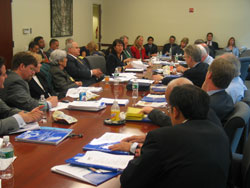 |
|
|
Ambassador Asmady of Indonesia addresses the strategy session on a nuclear weapons convention.
|
Ambassador Asmady of Indonesia asserted that the “step by step approach” envisioned by the nuclear NPT review process “has not advanced the disarmament agenda. Therefore,” she stated, “we believe that a multilateral, comprehensive approach is the way forward.” She continued to assert that the Geneva-based Conference on Disarmament as “the logical forum”, though she acknowledged the value of “an international conference of world leaders.” The substance advancing the disarmament agenda could also be discussed in a fourth Special Session (of the General Assembly) on Disarmament, such as what the Non-Aligned Movement has been pushing for years. Indonesia would also be open, she said, to a summit convened by the Security Council, such as that suggested by the Secretary-General.
Ambassador Butler underscored the point that, as “the greatest threat to humanity and the environment as we know,” nuclear weapons must be completely outlawed. The problem, he stated, has nothing to do with “the quantity, the power, the technical aspects, or their range,” he insisted, but rather “the fact of their very existence.” The only logical conclusion is that we must eliminate them.” Citing the the “Axiom of Proliferation” identified by the Canberra Commission, (4) Ambassador Butler, a member of the Commission, maintains that as long as nuclear weapons exist, they will be sought by others and will be used by accident or design. Ambassador Butler (currently a professor at New York University), denied arguments that claim nuclear abolition would be too difficult, citing the variety of steps, measures and approaches that have been proposed over the last two decades, including important treaties such as the Comprehensive nuclear Test-Ban Treaty (CTBT), a Fissile Materials Treaty, fuel cycle control and verification regimes.
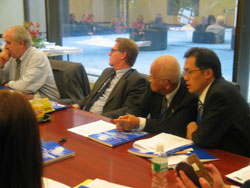 |
|
|
(L-R): Amb. Richard Butler, Amb. Bernhard Brasack, Mr. Mr. Taskashi Morita and Mr. Akira Kawasaki
|
Ambassador Butler then posed an important question over tactics: do we proceed to abolish nuclear weapons directly, that is, acknowledging that their existence is the problem and tackling it thus, or, do we adopt an indirect approach, which eats away at their legitimacy and existence? He also suggested that non-nuclear weapon states engage nuclear weapon states in negotiations only if the intent of the latter to succeed is sincere, lest negotiations drag out over ten years without any tangible results.
Not all participants in the session explicitly supported the idea of pursuing a comprehensive approach such as that embodied in a nuclear weapons convention. Ambassador Henrik Salander, representing the Government of Sweden, relayed his government’s opinion that such an ambitious undertaking could “crowd out incremental and complementary approaches” and ultimately put the NPT in jeopardy. He challenged the group further by suggesting that, if states can’t even get the entry-into-force of a CTBT, or begin the long overdue negotiations on a treaty banning the further production of weapons grade fissile materials, we are unlikely to succeed with more complicated negotiations on a nuclear weapons prohibition.
An important element, of course, in the future of the NPT, the NWC and the international disarmament regime as a whole is the outcome of the US presidential election. Ambassador Robert Grey, former US ambassador to the Conference on Disarmament and currently the Director of the DC-based Bipartisan Security Group, illustrated a litany of positive steps that will be taken by an Obama administration, such as the pursuit of CTBT ratification, dramatic reductions in space weapons programs and missile defenses, dramatic reductions of nuclear arsenals and improved relationship with Russia. Regarding a NWC, Ambassador Grey pleaded agnosticism, citing other dysfunctional international machinery that must be addressed, such as the ineffectualness of the General Assembly, the unrepresentative character of the Security Council, and other institutional problems with the UN system. The problem of nuclear weapons, he maintained, is “not just a question of laws, but a question of attitude.” He urged that we address these other pressing matters, suggesting that political conditions could change for the better, making a convention more viable at a later time.
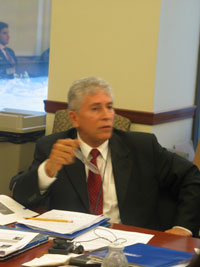 |
|
|
Mr. Carlos Vargas, Vice-President of the International Association of Lawyers against Nuclear Arms and former representative of Costa Rica
|
Mr. Carlos Vargas, Vice-President of the International Association of Lawyers against Nuclear Arms, discussed the importance of civil society in the pursuit of a global prohibition of nuclear weapons. It is civil society that will maintain the faith that is required in this difficult pursuit, just as Costa Ricans had faith that abolishing its army, contrary to the warnings of the United States and others, would enrich their security rather than diminish it. If we maintain faith in our mission, “however we pursue it, step by step or through a big convention, we must have faith that we will achieve our obligations.”
Addressing the emerging dichotomy between NWC supporters and those favoring an incremental approach, Mr. Alyn Ware, a consultant with the International Association of Lawyers against Nuclear Arms and the Global Coordinator of the network of Parliamentarians for Nuclear Non-proliferation and Disarmament (PNND), highlighted the suggestion of Dr. Henry Kissinger who, in the morning plenary, had favored a “parallel pursuit” of NPT obligations concurrent with negotiations on a NWC. Mr. Ware also echoed Mr. Vargas’ idea, noting that “we can’t just rely on diplomats.” In addition to the importance of civil society in pushing the issue on a political level, Mr. Ware noted the important role of parliamentarians, such as the nearly 600 MPs in the PNND network, spanning over 80 countries.(5)
An NGO representative called attention to the need for a nuclear weapons convention to tackle the issue of nuclear energy, as well as weapons in space and missiles, all of which have implications in the effectiveness of the efforts. In this respect, she commended the German Government for its support of IRENA, an International Renewable Energy Agency.
A representative of an international organization pointed out that, while the high level officials from several nuclear weapon states noted the importance of several measures, such as CTBT entry-into-force and further reductions of the world’s largest arsenals, “none said that my country is going to take the first step.” Nuclear abolition won’t happen if everybody is waiting for another to take the first step. She suggested that movement by the NATO countries, to eliminate their nuclear umbrella policy, would be such an important first step.
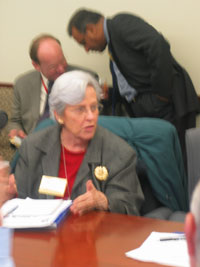 |
|
|
Alice Slater of the Nuclear Age
Peace Foundation |
There was concern expressed over ambition. While some thought a NWC may be too ambitious, others expressed concern that, should global stockpiles be reduced to 1000, should the CTBT enter-into-force and other positive steps taken, that the urgency of the pursuit of nuclear abolition will be muted and no more action taken. The window that is open now, such as that identified by Ambassador Grey, must be seized; we must think about how to put this issue high on the agenda of the new administration.
And finally, the session heard an important intervention from Mr. Taskashi Morita, a “hibakusha”, a survivor of the bombing of Hiroshima. Speaking through an interpreter, Mr. Morita said he had witnessed “complete hell,” tens of thousands of people dying amongst them the burnt corpses of children. The suffering and trauma inflicted upon Mr. Morita and other hibakusha motivates him to work for the total abolition of nuclear weapons, and he expressed his wholehearted support for our efforts, in this session and beyond.
In summation, Mr. Granoff noted the richness of the discussion, and that the two-hour session was not sufficient to come up with answers or a strategy. As the President of the Global Security Institute, a co-sponsor of the day’s event with the EastWest Institute, Mr. Granoff proposed that the two organizations partner again, to return after the new year to convene another longer session with a very focused agenda, based upon the important questions raised at this session, such as:
- How and when to bring in nuclear weapon states in the process of advancing a NWC?
- Should civil society play a supportive or leading role?
- Which, if any, states will take the lead in convening a conference to prepare the negotiations, a NWC “PrepCom”?
The political space has undoubtedly been opened, Mr. Granoff asserted, and now we have an obligation to seize it, “to do honor to the courage and the memory of those who so dreadfully suffered from the tragedy of Hiroshima and Nagasaki and who urge us to action and to join with them to work so that it doesn’t ever happen again.”
Special thanks go to the Bahà’í international Community United Nations Office for the use of their beautiful conference facility.
(1) See the full text of Secretary-General Ban’s speech at: https://www.un.org/News/Press/docs/2008/sgsm11881.doc.htm See “Securing Our Survival,” www.icanw.org. See also UN Doc A/C.1//52/7, the Model NWC as submitted by Costa Rica to the United Nations in 1997. Costa Rica submitted an updated version to the NPT Preparatory Committee meeting in Vienna (NP/CONF.2010/PC.I/WP.17) and to the UN General Assembly (UN Doc A/62/650).
(2) See “Securing Our Survival,” www.icanw.org. See also UN Doc A/C.1//52/7, the Model NWC as submitted by Costa Rica to the United Nations in 1997. Costa Rica submitted an updated version to the NPT Preparatory Committee meeting in Vienna (NP/CONF.2010/PC.I/WP.17) and to the UN General Assembly (UN Doc A/62/650).
(3) Through Article VI of the NPT, “Each of the Parties to the Treaty undertakes to pursue negotiations in good faith on effective measures relating to cessation of the nuclear arms race at an early date and to nuclear disarmament, and on a treaty on general and complete disarmament under strict and effective international control.”
(4) See the report of the Canberra Commission: https://www.ccnr.org/canberra.html
(5) For more information on the PNND network, see: www.gsinstitute.org/pnnd/index.html.
Jonathan Granoff is the President of the Global Security Institute, a representative to United Nations of the World Summits of Nobel Peace Laureates, a former Adjunct Professor of International Law at Widener University School of Law, and Senior Advisor to the Committee on National Security American Bar Association International Law Section.








